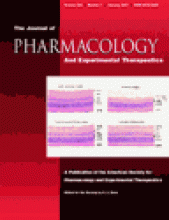Abstract
A specific and potent inhibitor ofS-adenosyl-l-homocysteine (AdoHcy) hydrolase, 9-[(1′R,2′S,3′R)-2′,3′-dihydroxycyclopentanyl]adenine (DHCaA), was evaluated for its immunosuppressive efficacy on murine T-cell proliferation in vitro and in several animal models, including delayed type hypersensitivity ear swelling and peptidoglycan polysaccharide-induced arthritis. The concanavalin A-induced [3H]thymidine incorporation into T cells was strongly inhibited by DHCaA with a 50% inhibition concentration (IC50) of 0.3 μM. In vivo, a dose-dependent reduction (39, 62, and 73%) of ear swelling was observed when 2,4-dinitrofluorobenzene-treated mice were orally administered with DHCaA at 1, 5, and 10 mg/kg, respectively. This inhibition in ear swelling dose dependently corresponded to the inhibition of AdoHcy hydrolase activity in the spleen. The more potent the AdoHcy hydrolase inhibitor, the stronger the immunosuppressive efficacy observed. In rat peptidoglycan polysaccharide-induced arthritis, orally dosed DHCaA significantly suppressed inflamed paw volumes with minimal effective dose of 0.1 mg/kg. At a dose of 1 mg/kg, DHCaA almost completely inhibited paw swelling. This inhibition of paw swelling was associated with an inhibition of interleukin-1β production in joint tissues. Histopathological evaluation of the joints in rats treated with 1 mg/kg showed a significant improvement in the reduction of the histopathological grading score from untreated scores of 10.44 to 4.78. Results from this study indicate that inhibitors of AdoHcy hydrolase could be effective anti-inflammatory agents.
Footnotes
-
Send reprint requests to: Dr. Yoshihisa Saso, Discovery Research Laboratory, Tanabe Seiyaku Co., Ltd., 2-2-50 Kawagishi, Toda, Saitama 335-8505, Japan. E-mail: y-saso{at}tanabe.co.jp
-
↵1 Current address: Discovery Research Laboratory, Tanabe Seiyaku Co., Ltd., 2-2-50 Kawagishi, Toda, Saitama 335-8505, Japan.
-
↵2 Current address: Diazyme Laboratories, 3550 General Atomics Court, P.O. Box 85608, San Diego, CA 92186.
- Abbreviations:
- AdoHcy
- S-adenosyl-l-homocysteine
- IL
- interleukin
- MDL28842
- (Z)-5′-fluoro-4′,5′-didehydro-5′-deoxyadenosine
- Hcy
- homocysteine
- DHCaA
- 9-[(1′R,2′S,3′R)-2′,3′-dihydroxycyclopentanyl]adenine
- DNFB
- 2,4-dinitrofluorobenzene
- DTH
- delayed type hypersensitivity
- PG/PS-A
- peptidoglycan polysaccharide-induced arthritis
- DHCeA
- 9-[(1′R,2′S,3′R)-2′,3′-dihydroxycyclopent-4′-en-1-yl]adenine
- Con A
- concanavalin A
- Ado
- adenosine
- ELISA
- enzyme-linked immunosorbent assay
- TNF
- tumor necrosis factor
- Received June 6, 2000.
- Accepted September 6, 2000.
- The American Society for Pharmacology and Experimental Therapeutics
JPET articles become freely available 12 months after publication, and remain freely available for 5 years.Non-open access articles that fall outside this five year window are available only to institutional subscribers and current ASPET members, or through the article purchase feature at the bottom of the page.
|






